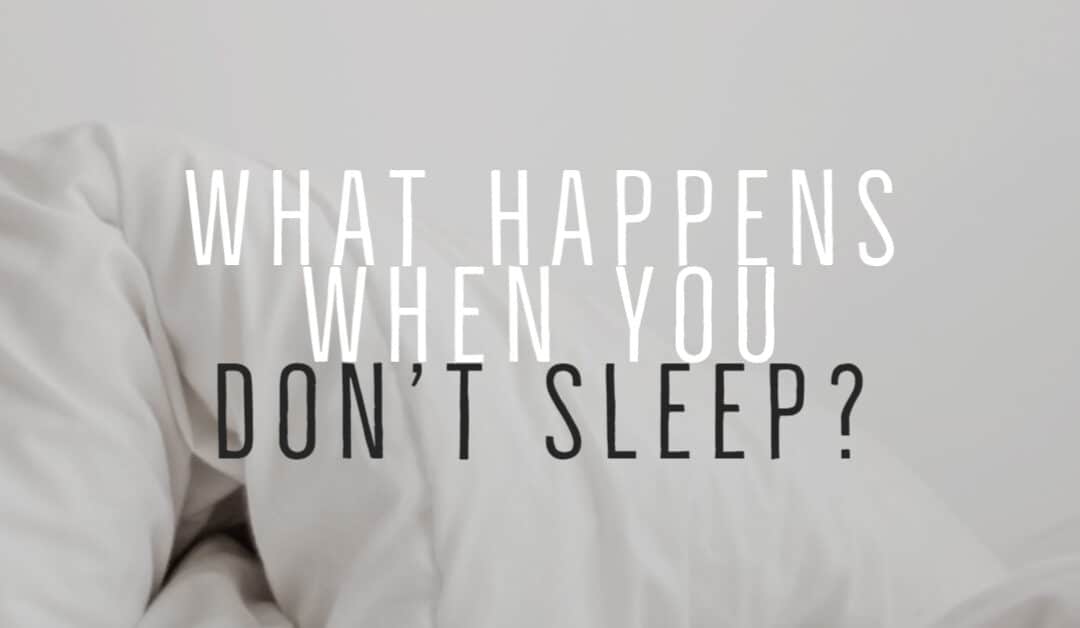We all know what it feels like to wake up after tossing and turning all night long. You wonder how to get through the day and may feel depressed or too exhausted to think straight. If you miss sleep often and don’t know why you may wonder what is causing your insomnia. But does it really matter if you don’t sleep well? Let’s look at what happens when you don’t sleep.
Lack of Sleep: Physical Symptoms
Choosing to ignore sleep problems and go years with less than optimal sleep can cause many health issues. Denial that you have a health issue contributing to your lack of sleep only makes your health suffer more. Chronic sleep deprivation causes potential severe problems including:
- High blood pressure
- Diabetes
- Heart attack
- Heart failure
- Stroke
Other potential problems include:
- Obesity
- Depression
- Impaired immunity
- Lower sex drive
- Tired appearance (1)
How Much Sleep Do I Need?
According to the CDC table below, we all need different amounts of sleep according to our age. The table below shows normal amounts of sleep for each age group.
| Age Group | Recommended Hours of Sleep Per Day | |
| Newborn | 0–3 months | 14–17 hours |
| Infant | 4–12 months | 12–16 hours per 24 hours (including naps) |
| Toddler | 1–2 years | 11–14 hours per 24 hours (including naps) |
| Preschool | 3–5 years | 10–13 hours per 24 hours (including naps) |
| School Age | 6–12 years | 9–12 hours per 24 hours |
| Teen | 13–18 years | 8–10 hours per 24 hours |
| Adult | 18–60 years | 7 or more hours per night |
| 61–64 years | 7–9 hours | |
| 65 years and older | 7–8 hours | |
Burning the Candle at Both Ends
If you are not sleeping because you choose to get less than the optimal hours of sleep, you may be one of the rare people who doesn’t need as much sleep as others. However, you should always see a sleep specialist before determining that you only need 5 hours of sleep per night. Your lack of sleep could even be causing health issues.
If you know you need more sleep but continually choose to stay up too late, look at what is driving this decision. Is your decision related to:
- Fear of losing out on your free time?
- Due to working long hours?
- Needing more quiet alone time?
- Living in denial that your lack of sleep affects your daily life?
- Afraid you’ll have trouble sleeping?
- Worried you will lie awake and stress instead of sleeping?
- Procrastination?
Whatever your reasons for choosing not to sleep, talking with a friend or a professional about your issues can help elucidate why you’ve decided to stay awake instead of going to bed when you need to. Choosing not to sleep is choosing to wake up with related health issues one day. Getting help to find out why you stay awake is wise.
Meeting your body’s needs for sleep keeps you healthier and happier. Why wouldn’t you want that for your life? Living your best life involves getting your best sleep.
But What If I Can’t Sleep?
Are you wanting to sleep and doing everything you can to make your sleep style healthier but still need answers? Finding the reason you can’t sleep is paramount when your zzz’s are lacking. Seeing an ENT doctor who specializes in sleep disorders can make all the difference. Often, a lack of sleep has a physical reason related to your overall health that a doctor can discover in a sleep study at their facility.
A Common Treatable Disorder
Sleep apnea is a common health issue in those who snore or wake up struggling to breathe during the night. Individuals who wake several times per night for no particular reason might also suffer from sleep apnea. There are three kinds of sleep apnea:
- Obstructive sleep apnea is a disorder where your body cannot breathe correctly because of relaxed tissues that obstruct your breathing passages. Often, those who struggle with obstructive sleep apnea snore throughout the night while struggling to breathe.
- Central sleep apnea is a condition where your brain doesn’t properly communicate with your breathing muscles. This lack of communication keeps your body from breathing and getting the oxygen it needs while sleeping.
- Complex sleep apnea is the diagnosis in those who suffer from both types of sleep apnea.
We Can Help
At Enticare, our ENT specialists focus on sleep disorders and helping you wake up feeling refreshed again. We focus on the solutions that help you sleep better. For obstructive sleep apnea, there are new solutions that don’t involve a CPAP machine. Sometimes, just coming in for a sleep study evaluation can make all the difference in getting your zzz’s again. Set up an appointment today and find out how we can help you sleep better again.
CDC sleep table references:
- Hirshkowitz M, Whiton K, Albert SM, Alessi C, Bruni O, et al. The National Sleep Foundation’s sleep time duration recommendations: methodology and results summary. Sleep Health. 2015;1(1):40–43.
- Paruthi S, Brooks LJ, D’Ambrosio C, Hall WA, Kotagal S, Lloyd RM, et al. Recommended amount of sleep for pediatric populations: a consensus statement of the American Academy of Sleep Medicine. J Clin Sleep Med. 2016;12(6):785–786.
- Watson NF, Badr MS, Belenky G, et al. Recommended amount of sleep for a healthy adult: a joint consensus statement of the American Academy of Sleep Medicine and Sleep Research Society. Sleep. 2015;38(6):843–844.

